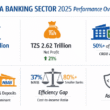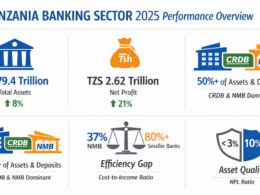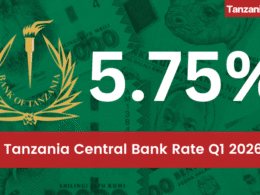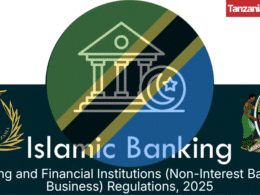TanzaniaInvest interviewed Richard Makungwa, CEO of Mwalimu Commercial Bank Plc (MCB), a commercial bank that serves individuals and businesses that is making significant strides towards profitability and growth, and that is opening to investors.
In this in-depth conversation, Makungwa discusses the bank’s origins, its strategic approach to addressing challenges, recent financial performance, and future expansion plans which include a rights issue exercise and exploring equity partnerships.
He also provides valuable insights into the Tanzanian banking industry, the role of fintech, and the macroeconomic landscape.
TanzaniaInvest: What are the origins of MCB Bank, and how has it developed over the years?
Richard Makungwa: This bank was originally initiated by the Tanzania Teachers Union to provide their own bank due to high interest rates and them being a significant portion of the government workforce in Tanzania. The shareholders were primarily the teachers themselves, totalling over 200,000 individuals, and the Tanzania Teachers Union, holding about 35% and 13% of the shares respectively. Additionally, there were other shareholders such as the National Health Insurance Fund and the Public Service Pensions Fund, as well as other individuals holding 16%. The bank is listed on the Dar es Salaam Stock Exchange (DSE).
These shareholders came up with the idea to have their own bank sometime back in 2015. By 2016, they started the bank to address the issue of high interest rates.
TanzaniaInvest: How did the bank address the challenge of reaching teachers throughout the country, with lower interest rates?
Richard Makungwa: Since teachers are spread across different regions and districts, it was challenging to establish physical branches everywhere. So, penetrating the market has taken quite some time. However, despite being unable to successfully charge lower interest rates to teachers, we were able to drive down the market rates. On the other hand, we made a strategic choice to go digital, ensuring service accessibility 24/7. The bank connected to Visa (MwalimuVisa), established Agency banking (MwalimuWakala), and launched mobile money (MwalimuMobile). About 95% of our transactions go through digital platforms.
“About 95% of our transactions go through digital platforms.”
TanzaniaInvest: How has the bank performed financially amid all the challenges since its inception?
Richard Makungwa: I joined the bank in 2019 when it was a loss-making entity. We realized the need for a realistic turnaround strategy. The focus was now on four key drivers: deposit generation, service accessibility, cost control, and efficiency. We started by targeting existing shareholders for deposit generation and re-establishing relationships with individual teachers across the country. By 2022, we had cut losses down to TZS 296M from TZS 4B in 2019.
“By 2022, we had cut losses down to TZS 296M from TZS 4B in 2019.”
TanzaniaInvest: Are there plans to expand into other segments?
Richard Makungwa: Yes, we have ventured into bancassurance and other tailor-made products, and we offer services to individuals and businesses. We are currently looking to expand into the micro, small, and medium enterprise (MSMEs) market. However, adequate funding is crucial for this expansion.
“We are currently looking to expand into the micro, small, and medium enterprise (MSMEs) market.”
TanzaniaInvest: What is the strategy for raising funds?
Richard Makungwa: We are seeking long-term funders and equity partners to stabilize the bank’s capital and solidify the bank’s liquidity. We are planning a rights issue exercise with existing shareholders and exploring potential underwriters for equity partnership. We are in talks with potential equity investors, and the exercise is planned to take place after August 2023.
“We are seeking long-term funders and equity partners [and] are planning a rights issue exercise with existing shareholders and exploring potential underwriters for equity partnership.”
TanzaniaInvest: How do you ensure the safety, security, and profitability of the bank for potential investors?
Richard Makungwa: The bank’s fundamentals are solid. The potential for profitability is evident from our turnaround over the past four years. We have transformed from significant losses to a break-even point and are set to start seeing profits. However, the main challenge remains securing funding for sustainable growth.
“The bank’s fundamentals are solid. The potential for profitability is evident from our turnaround over the past four years.”
TanzaniaInvest: What are your projections for the next five years? And what are the challenges ahead?
Richard Makungwa: Our aim is to achieve profitability this year (2023) and expand our client base with proper funding. We expect that with enough funding, we will be able to increase our customer base, including the teachers as we haven’t even exhausted this potential client base. Teachers still remain our core customers. Many banks serve this clientele because their non-performing loans are very low, given that they have a stable income, which allows them to borrow. Our next main target is to expand into the SME sector, which is in line with the Government’s drive for development and economic growth.
“Our aim is to achieve profitability this year (2023) and expand our client base with proper funding. “
TanzaniaInvest: What makes MCB the teachers’ favourite bank?
Richard Makungwa: First, it is their own bank. They have a natural affiliation with it because they are the first investors in the bank. Also, considering their borrowing habits, they need stable funding at all times because they continually borrow. With stable and proper funding, we can bring in more customers, and we will also be able to charge lower interest rates.
“With stable and proper funding, we can bring in more customers.”
TanzaniaInvest: There are currently 34 licensed commercial banks in Tanzania. Do you expect mergers and acquisitions?
Richard Makungwa: I think there are too many banks. I see some redundancy within the sector. In terms of profit, you’re talking about only a few banks that hold the majority of deposits. So funding is concentrated in those few banks, and smaller banks like ours struggle. There could be mergers, acquisitions, and consolidations happening within the next 5-10 years. So, I foresee larger banks eventually absorbing the smaller banks in the next few years. It might be necessary for the health of the sector.
TanzaniaInvest: What about fintechs? They are disrupting the industry and could be competitors or service providers to the unbanked population.
Richard Makungwa: We cannot directly compete with fintechs. They have a much larger customer base. Fintechs have a wider reach and can offer services like lending directly to customers through mobile platforms. Our strategy is to partner with fintech companies. We already have partnerships for running our mobile banking platforms. We see the value in collaborating rather than competing directly. As for physical branches, we may still need them in specific areas where a physical presence is necessary for effective loan management. However, our focus is on a combination of digital and physical services.
“Our focus is on a combination of digital and physical services.”
TanzaniaInvest: Looking at the macroeconomic landscape, with the economy projected to rebound strongly, which sector do you see as the most interesting for growth, and where do you see Tanzania in 10 years?
Richard Makungwa: I see great potential in sectors like agriculture, fisheries, and paddy farming. Tanzania has vast untapped resources, such as Lake Tanganyika, which stretches over 600 kilometres and has immense fishing potential. In 10 years, I believe Tanzania will lead in East Africa and possibly extend its influence to Central Africa. The government’s focus on infrastructure development, like the Standard Gauge Railway, will have a significant impact.











